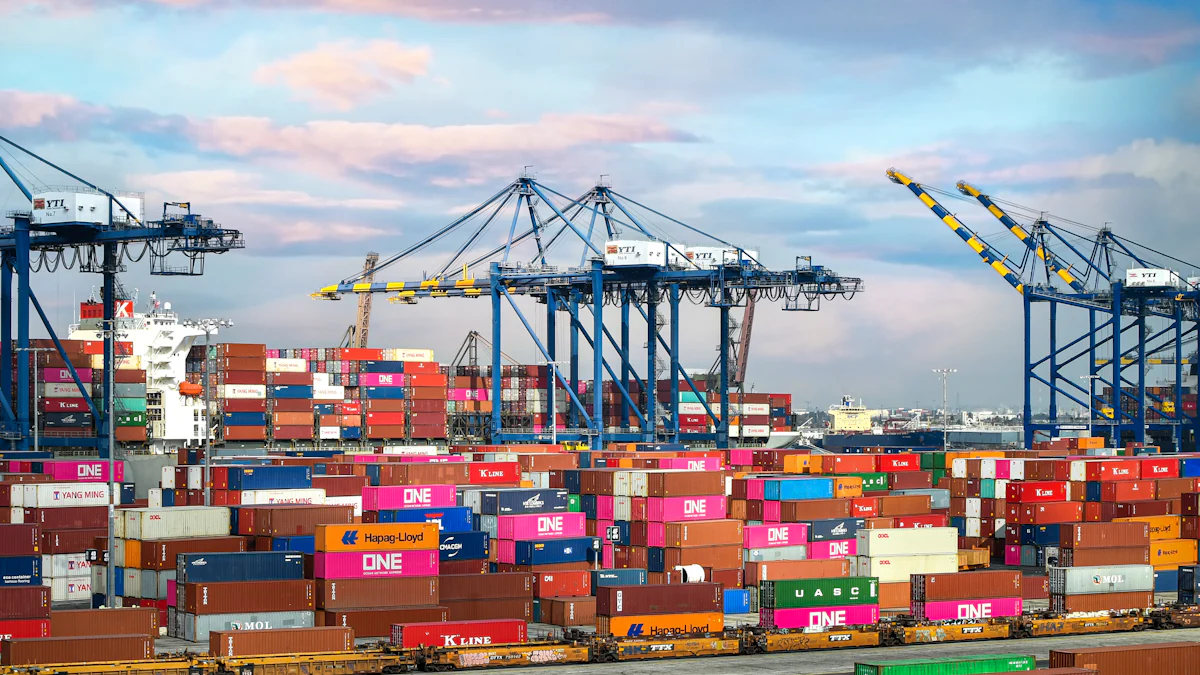How Technology is Driving Supply Chain Innovation

Technology has transformed supply chain management, making it smarter and more efficient. Innovations like IoT, AI, and blockchain enable real-time tracking, predictive analytics, and secure transactions. These advancements improve decision-making and operational efficiency. Embracing innovation ensures you stay competitive in a rapidly evolving global market.
Key Takeaways
Use tools like AI and IoT to make supply chains faster and smarter.
Try real-time tracking to check shipments and stock, saving money and keeping customers happy.
Spend on automation to make work easier, avoid mistakes, and plan better.
Key Technologies Transforming Supply Chain Management

Artificial Intelligence (AI) in Supply Chains
Artificial intelligence plays a pivotal role in modern supply chain management. It helps you optimize operations by analyzing vast amounts of data and providing actionable insights. AI-powered tools predict disruptions and suggest solutions, ensuring smooth operations. For example, companies like Domino’s Pizza use AI for demand forecasting, improving accuracy and customer satisfaction. AI also enhances inventory management by analyzing past sales and market trends. This reduces forecasting errors by up to 50%, minimizing costs associated with overstocking or understocking. Real-time AI devices, such as RFID technology, further improve visibility across the supply chain, helping you make informed decisions.
Internet of Things (IoT) for Real-Time Visibility
The Internet of Things transforms supply chains by offering real-time visibility. IoT devices like RFID chips and GPS trackers allow you to monitor shipments and inventory levels. This ensures products are available without overstocking or shortages. Environmental sensors maintain product quality by monitoring storage conditions, especially in cold chain management. Companies like Amazon use IoT-enabled robots in warehouses to streamline operations. By integrating IoT with digital supply chain platforms, you gain a consolidated view of goods in transit, improving decision-making and customer satisfaction.
Blockchain for Secure and Transparent Transactions
Blockchain technology ensures secure and transparent transactions in supply chains. It creates an immutable ledger that records every transaction, enhancing trust among stakeholders. You can trace products back to their origin, ensuring data accuracy and integrity. Blockchain simplifies provenance tracking, making it easier to verify product authenticity. This technology-driven approach builds resilience in supply chain management by providing a single source of truth for all parties involved.
Automation in Supply Chain Operations
Automation revolutionizes supply chain operations by increasing efficiency and reducing errors. Automated systems adjust order volumes and update distribution strategies instantly, preventing stockouts and excess inventory. Technologies like robotics and AI streamline repetitive tasks, allowing you to focus on strategic activities. For instance, automated route planning reduces fuel costs and delivery times. By adopting automation in supply chain processes, you enhance productivity and achieve significant cost savings. This digital transformation ensures your operations remain competitive in a rapidly evolving market.
Benefits of Technology in Global Supply Chain Management
Enhancing Supply Chain Resilience and Agility
Technology plays a critical role in enhancing supply chain resilience and agility. You can use real-time monitoring tools to track shipments and inventory, ensuring quick responses to disruptions. AI and machine learning provide predictive insights, helping you anticipate potential issues before they occur. Flexible strategies, powered by digital supply chain platforms, allow you to adapt to market changes effectively.
Companies must focus on maintaining supply chains during disruptions like the Covid-19 pandemic.
Real-time analytics and automation improve decision-making and operational efficiency.
Modern systems replace outdated methods, enabling faster responses to challenges.
By adopting these technologies, you create resilient supply chains capable of withstanding unexpected events. This proactive approach ensures long-term benefits, including cost savings and improved customer satisfaction.
Cost Optimization and Resource Efficiency
Technology helps you optimize costs and improve resource efficiency in supply chain operations. Real-time visibility platforms allow you to monitor shipment statuses, reducing storage costs and improving planning. AI-driven analytics streamline operations, minimizing human errors and enhancing inventory management.
Automation reduces operational expenses by eliminating repetitive tasks.
Advanced tools like predictive analytics help you select cost-effective carriers.
Enhanced customer satisfaction leads to increased sales and profitability.
These innovations not only lower costs but also improve service levels, ensuring your supply chain remains competitive in a global market.
Improved Customer Experience and Transparency
Digital supply chain technologies transform customer experience and transparency. Real-time visibility tools let you track items at any stage, ensuring accurate delivery timelines. Enhanced collaboration among stakeholders improves product quality and safety.
AI and IoT enable personalized services and faster issue resolution.
Blockchain ensures data accuracy, building trust with customers.
Companies like Ryder use advanced tools like AR wearables to optimize warehouse operations.
This transformation supports real-time decision-making and fosters transparency, which has become a strategic priority for businesses. By leveraging these tools, you meet customer expectations and build stronger relationships.
Challenges and Strategies for Implementing Supply Chain Technologies
Addressing Cybersecurity and Data Privacy Concerns
Cybersecurity and data privacy are critical when adopting digital supply chain technologies. Poor third-party cybersecurity practices and employee negligence often lead to breaches. Malicious insiders and excessive access rights further increase vulnerabilities. Without proper visibility over third-party systems, you may struggle to secure sensitive data effectively.
Tip: Protect your supply chain by implementing robust encryption and access controls.
You can also develop incident response plans to address cyber threats involving suppliers. Regularly updating software with security patches minimizes risks. Conducting supply chain risk assessments helps you identify vulnerabilities and prioritize high-risk suppliers. Establishing a Cyber Supply Chain Risk Management (C-SCRM) program ensures accountability and fosters collaboration with partners. Continuous monitoring and employee training further enhance resilience against cyber threats.
Overcoming Integration and Disruption Challenges
Integrating new technologies into existing supply chain operations can be daunting. Modern supply chains require real-time visibility and seamless communication across stakeholders. However, outdated systems often lack the flexibility to meet these demands. Specialized ERP systems offer solutions but can be costly and complex to scale.
To minimize disruptions, improve supplier communication by designating a dedicated team. Regular discussions and timely notifications about order delays strengthen relationships. Investing in integrated systems enhances visibility, allowing you to track components and products efficiently. Predictive analytics can simulate scenarios, helping you prepare for future challenges. Backup inventory also ensures resilience during supply delays or demand spikes.
Bridging Skill Gaps and Managing Investments
The rapid transformation of supply chain management demands skilled professionals. However, many organizations face skill gaps that hinder the adoption of advanced technologies. Training programs and workshops can help you upskill your workforce. Collaborating with academic institutions and industry experts ensures access to the latest trends and practices.
Managing investments in digital supply chain technologies requires careful planning. Start by prioritizing solutions that align with your business goals. Gradual implementation reduces financial strain and allows you to measure the impact of each technology. By addressing skill gaps and managing resources effectively, you can drive innovation and achieve long-term success.
Future Trends in Supply Chain Technology

Predictive Analytics and Real-Time Decision Making
Predictive analytics is reshaping supply chain management by enabling smarter and faster decisions. You can leverage artificial intelligence, machine learning, and IoT to analyze data streams and predict potential disruptions. Real-time analytics provides immediate insights, helping you detect inefficiencies and adjust plans quickly. For example, AI-driven tools continuously monitor data to identify anomalies, allowing you to address issues before they escalate.
Real-time decision-making enhances operational efficiency by providing up-to-the-minute updates. You can track order backlogs, optimize inventory, and respond to challenges swiftly. Businesses using these technologies gain a competitive edge by improving planning and reducing delays. Predictive maintenance, powered by advanced analytics, also ensures equipment reliability, minimizing downtime and costs.
Autonomous Supply Chains and Quantum Computing
Autonomous supply chains represent a significant leap in modern innovations. These systems use robotics, AI, and quantum computing to automate processes and improve efficiency. Quantum algorithms optimize delivery routes, reducing fuel consumption and emissions. You can also use quantum computing to enhance route planning for autonomous vehicles, cutting travel time and energy use.
By integrating quantum computing, you gain real-time analysis capabilities that improve decision-making and risk management. For instance, quantum systems analyze large datasets to identify supply chain risks, enabling proactive solutions. These technologies not only streamline operations but also contribute to sustainability goals by reducing environmental impact.
Sustainability and Green Supply Chain Innovations
Sustainability is a top priority in supply chain trends. Modern innovations like smart sensors and telematics help you achieve sustainability goals by reducing greenhouse gas emissions. Smart sensors lower emissions in warehouses by optimizing lighting and HVAC systems. Telematics tracks vehicle conditions, cutting fuel consumption and addressing transportation-related emissions.
Blockchain enhances transparency by ensuring environmental compliance through smart contracts. You can adopt ecofriendly packaging solutions, such as biodegradable materials, to reduce plastic waste. Companies like Walmart use AI-driven forecasting to minimize overstocking, reducing energy usage and waste. DHL’s GoGreen Dashboard measures carbon emissions, helping you identify areas for optimization. These innovations align with sustainability goals, promoting greener and more efficient supply chains.

JUSDA Solutions
To provide you with professional solutions and quotations.
Technology has revolutionized supply chain management, offering tools that enhance efficiency and decision-making. Businesses must adopt innovative solutions like JUSDA’s Supply Chain Management Collaboration Platform to stay competitive.
87% of organizations plan to increase investments in supply chain technologies within two years.
58% of executives see AI as the most transformative tool for the industry.
Investing in these advancements builds resilience and ensures your supply chain remains future-ready.
See Also
Transforming Logistics Through Innovative Supply Chain Strategies
Embracing Change: Leveraging Technology in Supply Chain Management
Enhancing Efficiency with Cutting-Edge AI Supply Chain Solutions
